- Home
- Franz Kafka
The Trial: A New Translation Based on the Restored Text Page 23
The Trial: A New Translation Based on the Restored Text Read online
Page 23
K. said that with finality, but it was not his final judgment. He was too tired to take in all of the consequences of the story; they led him into unaccustomed areas of thought, toward abstract notions more suited for discussion by the officials of the court than by him. The simple tale had become shapeless; he wanted to shake off the thought of it, and the priest, who now showed great delicacy of feeling, allowed him to do so, accepting his remark in silence, although it surely was at odds with his own opinion.
They walked on for a while in silence; K. stayed close to the priest, not knowing in the darkness where he was. The lamp in his hand had long since gone out. Once, directly before him, the silver statue of a saint glimmered briefly, with only the gleam of its silver, then fell back at once into the darkness. Not wishing to remain entirely dependent on the priest, K. asked him: “Are we near the main entrance now?” “No,” said the priest, “we’re a long way from it. Do you want to leave already?” Although K. hadn’t been thinking of that at the moment, he said at once: “Of course, I have to go. I’m the chief financial officer of a bank, and they’re expecting me; I only came here to show the cathedral to a colleague from abroad.” “Well,” said the priest, holding his hand out to K., “go on then.” “But I can’t find my way in the dark alone,” said K. “Go left to the wall,” said the priest, “then just keep to the wall all the way and you’ll find a way out.” The priest had moved just a few steps away, but K. called out in a loud voice: “Please, wait a moment.” “I’m waiting,” said the priest. “Do you want anything else from me?” asked K. “No,” said the priest. “You were so friendly to me before,” said K., “and explained everything, but now you’re leaving as if I meant nothing to you.” “But you have to go,” said the priest. “Yes,” said K., “you must see that.” “First you must see who I am,” said the priest. “You’re the prison chaplain,” said K. and drew nearer to the priest; his immediate return to the bank wasn’t so important as he’d thought, he could easily stay here longer. “Therefore I belong to the court,” said the priest. “Why should I want something from you. The court wants nothing from you. It receives you when you come and dismisses you when you go.”
THE END
On the eve of his thirty-first birthday—it was around nine in the evening, when the streets are quiet—two gentlemen entered K.’s lodgings. In frock coats, pale and fat, with top hats that seemed immovable. After brief formalities at the outer door over who would enter first, the same formalities were repeated more elaborately before K.’s door. Without having been informed of their visit, K., also dressed in black, was sitting in an armchair near the door, slowly pulling on new gloves that stretched tightly over his fingers, with the look of someone expecting guests. He stood up immediately and regarded the gentlemen curiously. “So you are meant for me?” he asked. The gentlemen nodded, each pointing with the top hat in his hand toward the other. K. admitted to himself that he had been expecting different visitors. He went to the window and looked out again into the dark street. Almost all the windows across the way were still dark, in many the curtains had been lowered. In a lighted window on that floor two small children were playing together behind a grille, reaching out toward each other with their little hands, not yet capable of moving from the spot. “They’ve sent old supporting actors for me,” K. said to himself, and looked around again to confirm his impression. “They want to finish me off cheaply.” K. turned to them abruptly and asked: “Which theater are you playing at?” “Theater?” one of them asked, the corners of his mouth twitching, turning to the other for help. His companion gestured like a mute man struggling with his stubborn vocal cords. “They’re not prepared for questions,” K. said to himself, and went to get his hat.
The men wanted to take hold of K.’s arms on the stairway, but K. said: “Wait till we’re in the street, I’m not ill.” Just beyond the entrance, however, they took his arms in a manner K. had never before experienced in walking with anyone. They held their shoulders right behind his, didn’t crook their arms, but instead wrapped them about the whole length of his, seizing K.’s hands below with a well-trained, practiced, and irresistible grip. K. walked along stiffly between them; now they formed such a close unit that had one of them been struck down they would all have fallen. It was a unit of the sort seldom formed except by lifeless matter.
Beneath the street lamps K. tried several times, in spite of the difficulty imposed by their tight formation, to see his escorts more clearly than he had in the semidarkness of his room. “Perhaps they’re tenors,” he thought as he regarded their thick double chins. He was nauseated by the cleanliness of their faces. You could practically still see the cleansing hand that had wiped the corners of their eyes, rubbed their upper lips, scrubbed the folds of their chins.
When K. noticed that, he stopped, causing the others to stop as well; they were on the edge of an open, deserted square decorated with flower beds. “Why did they send you of all people?” he shouted more than asked. The men were apparently at a loss for an answer; they waited with their free arms dangling, like male nurses with a patient who needs to rest. “I’m not going any farther,” said K. to see what would happen. The men didn’t need to reply; they simply maintained their grip and tried to pry K. from the spot, but K. resisted. “I won’t need my strength much longer, I’ll use all I have now,” he thought. He pictured flies, tearing their tiny legs off as they struggled to escape the flypaper. “These gentlemen have their work cut out for them.”
At that moment, coming up a small flight of stairs to the square from a narrow lane below, Fräulein Bürstner appeared before them. He couldn’t be absolutely sure it was her; there was certainly a strong resemblance. But it made no difference to K. whether it was really Fräulein Bürstner; the futility of resistance was suddenly clear to him. There would be nothing heroic in resistance, in making trouble for these men, in trying to enjoy a final vestige of life by fighting back. He started moving again, and part of the pleasure he gave the men by doing so was transmitted back to him. Now they allowed him to choose the direction they should take, and he chose to follow in the steps of the young woman ahead of them, not because he wanted to catch up with her, and not because he wanted to keep her in sight for as long as possible, but simply not to forget the reminder she signified for him. “The only thing I can do now,” he said to himself, and the way his steps matched those of the other three confirmed his thoughts, “the only thing I can do now is keep my mind calm and analytical to the last. I’ve always wanted to seize the world with twenty hands, and what’s more with a motive that was hardly laudable. That was wrong; do I want to show now that even a yearlong trial could teach me nothing? Do I want to leave the parting impression that I’m slow-witted? Shall they say of me that at the beginning of my trial I wanted to end it, and now, at its end, I want to begin it again? I don’t want them to say that. I’m grateful they’ve sent these halfmute, insensitive men to accompany me on this journey, and that it’s been left to me to say myself what needs to be said.”
In the meantime the young woman had turned into a side street, but K. could do without her now and submitted to the men escorting him. Now all three of them, in total accord, crossed a bridge in the moonlight, the men yielding willingly to K.’s slightest move, and when he turned slightly toward the railing they too turned, presenting a solid front. Glittering and trembling in the moonlight, the water parted around a small island upon which the foliage of trees and shrubbery rose in masses, as if crowded together. Beneath the foliage, invisible now, were gravel paths with comfortable benches where for many a summer K. had relaxed and stretched his legs. “I didn’t really want to stop,” K. said to his escorts, shamed by their ready compliance. One of them seemed to be gently reproaching the other behind K.’s back for the mistaken stop, then they went on.
They walked along a few narrow, steeply rising lanes in which policemen were standing or walking about, at times in the distance and at times quite near to them. One of them with a bushy musta
che and his hand on the hilt of his saber stepped up to the not entirely unsuspicious-looking group with what appeared to be a purposeful stride. The men hesitated, the policeman seemed about to open his mouth, then K. pulled the men forward forcibly. He turned around cautiously several times to make sure the policeman wasn’t following; but when they had a corner between them and the policeman, K. started to run and the men had to run with him, although they were gasping for breath.
They were thus soon out of the city, which in this direction bordered on open fields with almost no transition. A small stone quarry, abandoned and desolate, lay beside a building which was still quite urban. Here the men halted, either because this spot had been their goal from the beginning, or because they were too tired to go any farther. Now they released K., who waited silently as they removed their top hats and wiped the perspiration from their foreheads with their handkerchiefs while they looked about the quarry. Moonlight lay everywhere with the naturalness and serenity no other light is granted.
After a brief polite exchange about who was responsible for the first of the tasks to come—the men seemed to have received their assignment without any specific division of labor—one of them went to K. and removed his jacket, his vest, and finally his shirt. K. shivered involuntarily, whereupon the man gave him a gentle, reassuring pat on the back. Then he folded the clothes carefully, as if they would be needed again, though not in the immediate future. In order not to leave K. standing motionless, exposed to the rather chilly night air, he took him by the arm and walked back and forth with him a little, while the other man searched for some suitable spot in the quarry. When he had found it, he waved, and the other gentleman led K. over to it. It was near the quarry wall, where a loose block of stone was lying. The men sat K. down on the ground, propped him against the stone, and laid his head down on it. In spite of all their efforts, and in spite of the cooperation K. gave them, his posture was still quite forced and implausible. So one of the men asked the other to let him work on positioning K. on his own for a while, but that didn’t improve things either. Finally they left K. in a position that wasn’t even the best of those they had already tried. Then one man opened his frock coat and, from a sheath on a belt that encircled his vest, drew forth a long, thin, double-edged butcher knife, held it up, and tested its sharpness in the light. Once more the nauseating courtesies began, one of them passed the knife across K. to the other, who passed it back over K. K. knew clearly now that it was his duty to seize the knife as it floated from hand to hand above him and plunge it into himself. But he didn’t do so; instead he twisted his still-free neck and looked about him. He could not rise entirely to the occasion, he could not relieve the authorities of all their work; the responsibility for this final failure lay with whoever had denied him the remnant of strength necessary to do so. His gaze fell upon the top story of the building adjoining the quarry. Like a light flicking on, the casements of a window flew open, a human figure, faint and insubstantial at that distance and height, leaned far out abruptly, and stretched both arms out even further. Who was it? A friend? A good person? Someone who cared? Someone who wanted to help? Was it just one person? Was it everyone? Was there still help? Were there objections that had been forgotten? Of course there were. Logic is no doubt unshakable, but it can’t withstand a person who wants to live. Where was the judge he’d never seen? Where was the high court he’d never reached? He raised his hands and spread out all his fingers.
But the hands of one man were right at K.’s throat, while the other thrust the knife into his heart and turned it there twice. With failing sight K. saw how the men drew near his face, leaning cheek-to-cheek to observe the verdict. “Like a dog!” he said; it seemed as though the shame was to outlive him.
FRAGMENTS
B.’S FRIEND
Over the next few days K. was unable to exchange even a few words with Fräulein Bürstner. He tried any number of approaches, but she always managed to avoid him. He came straight home from the office, sat on the divan in his room without turning on the light, and concentrated all his attention on the hall. If the maid happened to pass by and shut the door to the apparently empty room, he would get up after a moment or so and open it again. He rose an hour earlier than usual each morning on the chance that he might meet Fräulein Bürstner alone as she was leaving for the office. But none of these attempts succeeded. Then he wrote a letter, both to her office and to her lodgings, in which he tried again to justify his behavior, offered to make whatever amends he could, promised never to transgress whatever boundaries she might choose to set, and asked only for a chance to speak with her, particularly since he couldn’t settle things with Frau Grubach without first conferring with her, and finally, informed her that he would spend the entire day in his room that coming Sunday, waiting for some sign she might grant his request, or at least explain to him why she couldn’t, in spite of the fact that he had promised to do as she wished in all respects. The letters were not returned, but neither were they answered. On Sunday, however, he was given a sign whose meaning was sufficiently clear. Early that morning, K. observed through the keyhole an odd commotion in the hall which was soon clarified. A French teacher, a German by the name of Montag, a weak, pale young woman with a slight limp who had been living in a room of her own till then, was moving in with Fräulein Bürstner. For hours she could be seen shuffling back and forth in the hall. There was always some piece of laundry, or a coverlet, or a book that had been forgotten, for which a special trip to the new room had to be made.
When Frau Grubach brought K. his breakfast—ever since she had angered K. so, she no longer entrusted the maid with even the smallest task—K. couldn’t resist speaking to her for the first time in five days. “Why is there such a racket in the hall today?” he asked as he poured his coffee. “Isn’t there some way to stop it? Must we have housecleaning on a Sunday?” Even though K. didn’t glance up at Frau Grubach, he noticed that she seemed to sigh in relief. Even these stern queries on K.’s part she read as forgiveness, or the initial stage of forgiveness. “It’s not a housecleaning, Herr K.,” she said, “Fräulein Montag is simply moving in with Fräulein Bürstner and she’s carrying her things over.” She said nothing more, waiting to see K.’s reaction and whether he would permit her to go on talking. But K. put her to the test, stirring his coffee pensively and saying nothing. Then he looked up at her and said: “Have you put aside your earlier suspicions about Fräulein Bürstner yet?” “Herr K.,” cried Frau Grubach, who had been waiting for just this question and now stretched her clasped hands toward him, “you took a casual remark so seriously then. I hadn’t the least intention of offending you or anyone else. You’ve known me long enough to know that, Herr K. You don’t know how I’ve suffered the last few days! That I would slander my boarders! And you thought I had, Herr K.! And said I should give you notice! Give you notice!” Her final exclamation was already choked by tears; she raised her apron to her face and sobbed aloud.
“Please don’t cry, Frau Grubach,” said K., gazing out the window; he was thinking only of Fräulein Bürstner and that she was taking a stranger into her room. “Please don’t cry,” he said again, as he turned back toward the room and Frau Grubach continued to weep. “I didn’t mean to be so harsh either then. We just misunderstood one another. That happens sometimes, even to old friends.” Frau Grubach lowered the apron from her eyes to see if K. was truly appeased. “That’s all it was,” said K., and ventured to add, since he gathered from Frau Grubach’s behavior that the captain hadn’t told her anything: “Do you really think I’d let some young woman I don’t really know come between us?” “That’s just it, Herr K.,” said Frau Grubach, whose misfortune it was to say something awkward the moment she began to relax in the least, “I kept asking myself: Why is Herr K. taking such an interest in Fräulein Bürstner? Why is he arguing with me about her, when he knows I lose sleep over every angry word he says? After all, all I said about Fräulein Bürstner was what I’d seen with my own eyes.” K. mad
e no reply; it would have meant driving her from the room at the very first word, and he didn’t want to do that. He was content to drink his coffee and allow Frau Grubach to feel superfluous. Outside, the dragging steps of Fräulein Montag could be heard once more along the entire length of the hall. “Do you hear that?” asked K., pointing toward the door. “Yes,” Frau Grubach said with a sigh, “I wanted to help her, and have the maid help too, but she’s stubborn, she wants to move everything herself. I’m surprised at Fräulein Bürstner. I regret having Fräulein Montag as a boarder often enough, and now Fräulein Bürstner is taking her into her own room.” “That shouldn’t bother you,” said K., crushing the sugary residue in his cup. “Do you lose anything by it?” “No,” said Frau Grubach, “it’s even good as far as I’m concerned; it leaves a room free for my nephew, the captain. I’ve been worried he might have bothered you the last few days while I had to let him sleep next door in the living room. He’s not particularly considerate.” “What an idea!” said K., standing up; “not in the least. You seem to think I’m overly sensitive just because I can’t stand listening to Fräulein Montag—there she goes back again—making all those trips.” Frau Grubach found herself at a loss. “Should I tell her to postpone the rest of the move, Herr K.? I’ll do so at once if you wish.” “But she’s moving in with Fräulein Bürstner!” said K. “Yes,” said Frau Grubach, not quite seeing K.’s point. “Well, then,” said K., “she has to take her things there.” Frau Grubach merely nodded. This silent helplessness, which had the surface appearance of stubbornness, irritated K. even further. He began pacing back and forth in the room from window to door, giving Frau Grubach no opportunity to slip away, which she would otherwise no doubt have done.

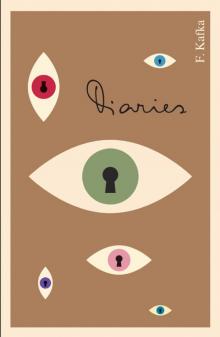 Diaries of Franz Kafka
Diaries of Franz Kafka Metamorphosis and Other Stories
Metamorphosis and Other Stories The Castle: A New Translation Based on the Restored Text
The Castle: A New Translation Based on the Restored Text The Complete Stories
The Complete Stories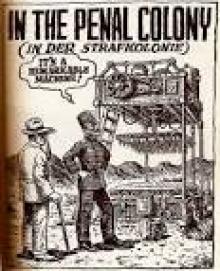 In the Penal Colony
In the Penal Colony The Trial
The Trial Amerika
Amerika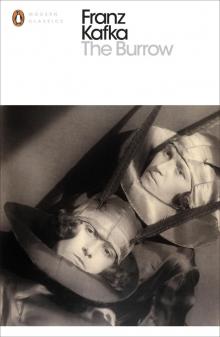 The Burrow: Posthumously Published Short Fiction
The Burrow: Posthumously Published Short Fiction Sons
Sons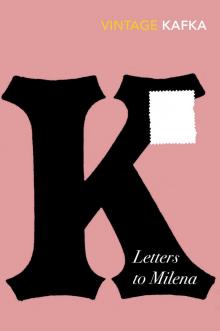 Letters to Milena
Letters to Milena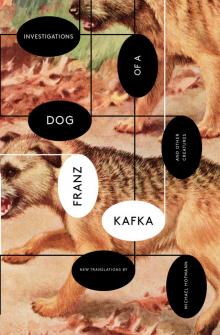 Investigations of a Dog: And Other Creatures
Investigations of a Dog: And Other Creatures Collected Stories
Collected Stories The Great Wall of China
The Great Wall of China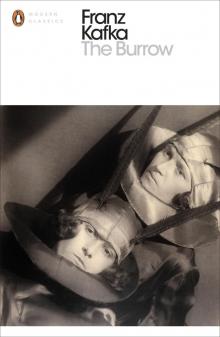 The Burrow
The Burrow The Castle
The Castle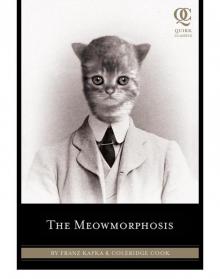 The Meowmorphosis
The Meowmorphosis The Sons
The Sons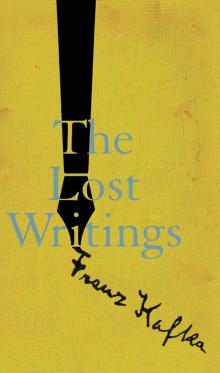 The Lost Writings
The Lost Writings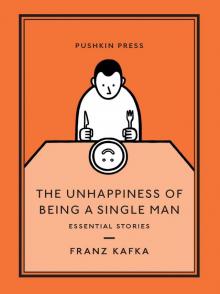 The Unhappiness of Being a Single Man
The Unhappiness of Being a Single Man Amerika: The Missing Person: A New Translation, Based on the Restored Text
Amerika: The Missing Person: A New Translation, Based on the Restored Text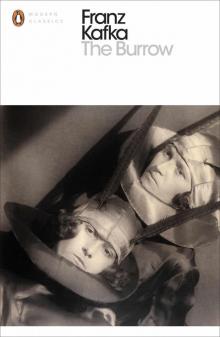 The Burrow: Posthumously Published Short Fiction (Penguin Modern Classics)
The Burrow: Posthumously Published Short Fiction (Penguin Modern Classics)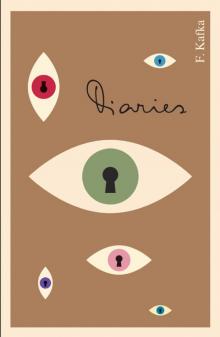 The Diaries of Franz Kafka
The Diaries of Franz Kafka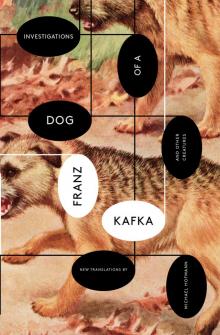 Investigations of a Dog
Investigations of a Dog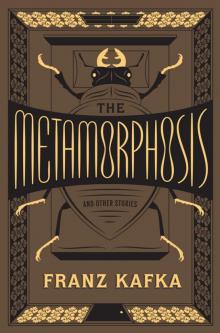 The Metamorphosis and Other Stories
The Metamorphosis and Other Stories The Trial: A New Translation Based on the Restored Text
The Trial: A New Translation Based on the Restored Text